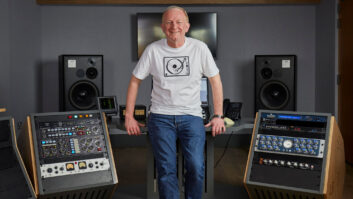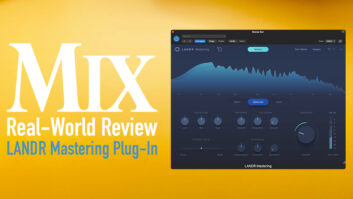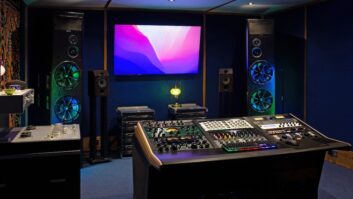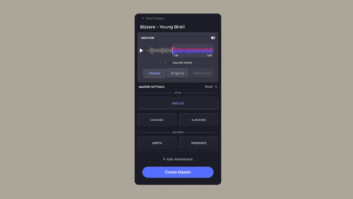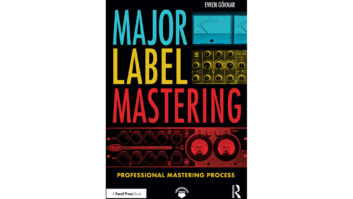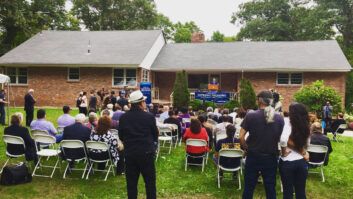As we close out the ’90s, it’s instructive to think back on all the changes we’ve seen over the course of the decade. In 1989, digital audio workstations were around, but pathetically anemic by today’s standards. Home studios were mostly “semi-pro,” and the project studio phenomenon was still in its infancy. Recordable CDs were found only in the lab, and the only format accepted by CD plants was the Sony PCM-1630. And high-quality digital audio processing tools were both rare and expensive.
In the last ten years, DAWs have taken major strides in quality, power and affordability, with a steady stream of “plug-ins” continually expanding their capabilities. Project studios are everywhere, and their output is all over the charts. The price of digital audio processing has fallen dramatically, in part because manufacturers have expanded their markets by pushing the “do-it-yourself” approach to making albums. And many CD plants are now unenthusiastic (at a minimum) about accepting PCM-1630s, preferring instead CD-Rs that may be “burned” on computer-hosted drives selling for well under $500.
The upheavals these changes have brought to the studio business have been thoroughly documented, but what about their impact on the field of mastering? Are the same technological and business trends that fueled project studios likely to pose a threat to established professional mastering houses? If you don’t need a lacquer-cutting lathe or a PCM-1630 to make a master, why do you need mastering at all? And even if you do go to a mastering house, why not do a lot of the “finalizing” yourself with one of the many affordable digital processing tools now being marketed for mastering applications?
To help us sort through these questions, we turn to four engineers: two recording and two mastering. Charles Dye is producer/mixer at Tocha Productions in Miami; his recent credits include Ricky Martin, Sammy Hagar and Jon Bon Jovi. Jim Gardiner is owner and engineer at Pajama Recording Studios in Oakland, California, and has worked with artists including Tony! Toni! Tone!, Thomas Dolby, Angela Bofill and Vanessa Williams. Scott Hull’s 15 years of mastering include recent projects with Garbage, Ani DiFranco, and Steely Dan; Hull recently became chief mastering engineer at Classic Sound in New York City after many years at Masterdisk. And Steve Hall is V.P./chief engineer at Hollywood’s Future Disc Systems, where he masters albums by artists such as Madonna, Fleetwood Mac, Green Day and Alanis Morissette.
What does mastering in a professional mastering house bring to a music project that can’t be done in a project studio or a traditional recording studio?
Charles Dye: For me, it’s the fresh perspective of someone that spends their entire day hearing all the soon-to-be latest hits. It gives me confidence to have someone like that making sure that my work will compete with the rest of the music on the radio. The other factor is hearing your own record in a fresh listening environment, one that may be tuned much more accurately than where you mixed it. Often you will hear something you hadn’t heard before.
Jim Gardiner: The mixing engineer has a certain idea of how the project should be shaped, so he is cutting the diamond. But then you take it to premastering to make the diamond sparkle before it goes into that jewel box. You want a place that has a track record, where the person who is doing the premastering has tons of experience. It takes years of patience and practice to learn where all the frequencies are for all the different instruments.
Mastering is also the time to go through all the things that need to be checked-phase, imaging, pops and noises-that you may have missed. You need a good monitoring environment that’s set up for doing that. If your room isn’t right, and you can’t hear accurately what you’ve got while you are mastering, it’s impossible to tell what it’s going to sound like out in the world. And the whole purpose is to have mixes that will sound good on everybody’s system.
Steve Hall: One of the important things a professional mastering house has to offer is expertise. A mastering engineer has spent numerous hours learning how to treat various types of music so your project can compete in the market it will be addressing. And they hear all kinds of music, so they have a good understanding of how your material stacks up in the real world. They also know when to tweak things and when to leave things alone, which is probably the hardest part of the job. Another reason is objectivity. You may have been in the studio for the last six months, but they will be hearing your mix for the first time, with fresh and trained ears.
When it comes to the creation of the “master,” the greatest advantage is that the mastering engineer will know what the best format is, and which format the various manufacturing plants can handle without transferring your master numerous times on the way to the glass master. Some of these transfers can add up to some pretty ugly sonic results on your manufactured CD.
Scott Hull: A professional mastering engineer has a long history of mastering music projects, and brings that experience to every project. And he or she knows the listening environment intimately, so your recording can be compared to all the other recordings mastered there to determine what’s needed. A recording isn’t “mastered” when it’s been edited, or when the level and high end are maxed out. A well-mastered project sounds like a complete statement, greater than the sum of the parts.
In general, what’s the appropriate point in production at which the role of the recording/mixing facility should end, and the mastering house should begin? At what point is further work in the studio counterproductive, and what are some of the consequences that can arise when attempts are made to “master” the material before it gets to the mastering house?
Dye: It’s obvious that too much stereo-bus compression and EQ can limit the mastering engineer’s options. But I don’t particularly believe that stereo-bus compression, EQ and limiting are evil. If you have a specific sound that you hear in your head, and stereo-bus processing will help you capture that, then do it. The stereo mix bus processing on “Livin’ La Vida Loca” was quite integral to its sound.
Gardiner: I get tapes from people that want me to listen to their work, and the compression and limiting have taken away the natural air or breathing of the music. They just crunch the hell out of everything, and print it that way to their master, so you can’t really take it out later. When I am going to be handing something off to mastering, I like to be conservative with what I do on my side. As long as the general mix sounds great, I’ll leave a window for the mastering engineer to do the final polish.
Also, if people are using the equipment in a recording or project studio, it’s not going to be the same as the top-end stuff they have in a mastering house. Quality comes at a price, and people should be aware that inexpensive boxes can create certain colors in the sound. There’s a whole lot of push from manufacturers to sell premastering tools for $500 to run on a PC, but you can’t assume that just because someone can buy this stuff they have tremendous skills in mastering.
Hall: The point when the mix studio is finished and mastering starts can be difficult to determine. Projects can vary greatly in the type of finish work required. Some projects require an entire day spent on crossfades, sequencing, cutting various mixes together, or maybe even flying in parts. Others come in completely assembled with tracks properly spaced and faded. That usually makes my job much easier.
One of the most frustrating problems in the mastering room is when someone tries to master a project before going to mastering. If you are going to take this approach, be very sure that you don’t overdo or abuse the process you are using, because it’s very hard, if not impossible, to reverse. If you are using a particular product for a certain type of sound or effect, and you like the way it sounds, then by all means go for it. But if you’re going to compress the crap out of it, don’t ask me to fix it!
Hull: The mastering process can begin well in advance of the mastering session, at any point that the engineer or producer wants a little advice. I can help clients decide the best way to proceed, and to avoid things that can adversely affect their project. This relationship helps the producer optimize his time in the recording studio and in the mastering studio.
There are at least two reasons why it is never a good idea to premaster in the recording studio. First, any copy or processing of the original material will degrade the music, and most of the time these changes in sound quality will show up in the mastering room, meaning that the project has to be redone from the original tapes anyway. Second, the equalizers and compressors that mastering engineers choose are designed for a very different purpose than tracking and mixing gear. You may have the right idea that your recording needs attention around the bass or lead vocal, but the tools we have, with our experience, will do a better job of it, and do less collateral damage to the rest of the recording. There’s nothing wrong with optimizing your work to submit it to the label so that it will not seem too low in level compared to other CDs, but it should be labeled as “not for production.”
What should the producers of limited-budget projects be doing-and not doing-in preparation for mastering to ensure that they use their mastering time most efficiently, so that they can afford a professional mastering job?
Dye: They should definitely have their master assembled before going into mastering. Then they should put their assembled, unmastered album on CD-R and listen to it for a week on every system they can find, taking notes about the relative levels of the songs, the levels of the intros compared to the previous song, the sound of the vocals from song to song, and, of course, the top and low end from song to song.
Gardiner: Depending on the client, I try to give the mastering house a master that is already sequenced. You can save time and money in mastering by trimming all beginnings and doing all the fades. You should also create a track list with the times. And it is very helpful to choose a core track that you can point out to the mastering engineer as an example of what you think all your tracks should sound like. Another thing that’s important is that during mixing you should make sure that you don’t lose everything when you turn it down. The tracks should have sufficient definition that you can still hear everything when you listen soft.
Hall: I have a few tips for getting the most out of your mastering buck. Start by showing up on time, because the clock is running. Try to make sure that someone remembered to bring or send the tapes, preferably the day before the session, and make sure we have the tones-that tune at the head of the reel that has only a few really long notes. If you’re going to show up with 25 boxes of masters, try to have some idea of which is the real mix; if we have to listen to five different mixes on each song, the day will be shot and so will your budget. Make sure the tapes are clearly marked. Have your tunes edited if you can, make sure you’re finished mixing, and you don’t need to fly in a guitar part or two. If you want to save more time and money, have your master assembled on a single format, and make sure your songs are faded properly and spaced the way you want.
Hull: One thing that can be very expensive and time-consuming in the mastering studio is making decisions. I highly recommend that the producer and the band sit down at a DAW and edit the choice takes together before they get to mastering. You can try many different sequences and different mixes and edits. Make as many of these decisions as possible before the mastering session. A complete typed-out listing of what takes are to be used for each song is very helpful.
The edited copy that you make will be used as a reference for the final sequence and EQ, but not as the master, so bring all of the original master tapes to the session. It’s actually just as fast to let an experienced mastering engineer work from the originals as it is to pre-assemble and or premaster, because it happens a lot that the mastering EQ or compression convinces the client to pick a different mix.
Label your master tapes as if they are the most important thing to you. And check the IDs on your DAT tapes. It’s a huge waste of time to go searching for missing ID numbers.
What’s the appropriate response to a producer who says there is not enough money in the budget to master at a professional mastering house? Is there a need and/or a way for traditional mastering houses to make their services more accessible for limited-budget projects?
Dye: One radical approach to addressing costs is what has happened in the recording engineering community in the last ten years. As producers began building home studios, they brought recording engineers in to record their projects for them. That movement was gear-driven, and now there is equipment available that gives mastering tools to project studios. There will be no stopping this movement, and the only thing to do will be to adapt to it. Soon, established mastering engineers will be going into project studios to freelance, if it’s not happening already.
Gardiner: There are places in any budget that you can find to take shortcuts, but the best place not to shortcut is in taking it to a really qualified premastering place. You are competing against every major artist in the universe, so anything that is mediocre just won’t work. Besides having your music be hipper than whatever else is out there, you need to sound as good or better than everyone else to get through. And that can cost money.
Hall: At most professional mastering houses you will find a collection of the finest custom consoles and signal processing devices available, and most mastering rooms invest frequently in new DAWs, new converters with higher sample rates, newer digital equalizers and compressors, increased hard disk storage, and networking. Many of us are pushing the curve to implement surround mastering and DVD authoring. So I wouldn’t plan on rates coming down much in the near future.
Some labels want to save a buck and have their artists master in their own studios. If you’re spending a hundred grand on a project to record and mix-and making a couple of videos at $50,000 each-and you can’t muster another two or three grand for mastering, what’s wrong with this picture? We’re talking about putting the finishing touches on an album. This is the last chance you have to perfect everything you spent the last year of your life working on 12 hours a day. If you are going to make this project the best it can be, why would you want to omit this stage? I guess if you don’t think you need professional mastering for your project, the project must not be that important to you.
Hull: The question is: Are you trying to get the project done for the least expense, or are you trying to get the most musical effect out of it? New clients often come to my mastering session saying they are very happy with the way their project sounds. But after listening to it with just the right EQ or compression, they are often surprised that it can sound that much better. So if you say there isn’t enough money, maybe you don’t know what you’re missing, or you’ve been going to the wrong mastering engineer in the past.
One way to bring a truly limited-budget project to a professional mastering studio is by using one of the studio’s “up-and-coming” engineers. Most mastering studios I know have engineers that have years and years of experience and are trying very hard to break into the very competitive mastering world.Do you believe that every music project intended for commercial release should pass through a mastering house on its way to the CD plant, or are there some situations or kinds of projects for which the mastering step is not always necessary?
Dye: I think mastering is an essential process, but as I said earlier, I don’t believe the traditional business model for it will survive.
Gardiner: If you are doing a demo, and you just want to play it for your friends, that’s cool. But if it’s something that you put your life and love into, mastering could be the thing that makes the difference in the whole thing. All the great producers who have their own home studios and CD burners, and who use the best recording engineers on their projects, they still all go through professional mastering when it comes down to the final master.
Hall: I believe that every project can be improved or enhanced, at least to a certain extent. There may be times when some audiophile projects can bypass mastering, but why wouldn’t you want the best possible transfer through the cleanest chain available with the best possible dithering?
Hull: A few very high-profile projects I have worked on needed little or no EQ. But the producer felt it necessary to check with me just to be sure, because you can’t know if mastering is “necessary” until the mastering engineer and producer listen to the recording together and discuss the goals of the project. So the process of making that determination should always be a part of your production schedule and budget.
How do you expect the role of the traditional mastering house to evolve over the next few years in response to the extension of the project studio approach into the field of mastering? And what types of new services might mastering facilities be offering to further differentiate themselves from people with a DAW in their spare bedroom?
Dye: Following the pattern of recording studios in response to similar pressures, there will be some fallout in the mid-level mastering houses. But many of them will adapt to a new approach based upon their clients’ desire to own their own mastering equipment, and the mastering facilities and engineers will come up with a solution that will allow them to survive. The top-end houses will continue on, because the major labels see a lot of value in having that last person in the chain with a New York, L.A. or Nashville facility that they can go to from their offices to hear the final album. It gives them the control and the confidence that they need to have with their projects.
Gardiner: Depending on where you are located, mastering places are just now getting dialed into the surround thing. That’s a big issue, and the mastering places really need to get more involved, because there are so many questions right now in areas such as phase. It could be a great business for premastering.
Hall: The next few years will be very challenging for mastering professionals. You will always find the mastering studios leading the way in sonic excellence in our industry, and I believe that this will remain so as long as people need a source for true quality. But the mastering we will be doing is going to become a much more complicated and time-consuming process. In the future we may be mastering for CD, cassette, vinyl, DVD in high resolution, MP3 and surround. This constant evolution of technology will be a stumbling block for project studios because of the diverse mastering formats that will need to be addressed. It could be a bit overwhelming for the recording or project studio to create this variety of masters for a record label.
For DVD projects, I believe that the mastering house needs to be the authoring facility as well. The mastered audio will be already be on their hard drive, and they will be working with the artist and/or producer to create the finished product.
So we have installed a complete audio-video mastering suite with video encoding, authoring and graphics production for DVD. We are also currently upgrading for surround mastering, but this is a slow process. The tools that meet our standards are not yet fully developed, so we are working with several manufacturers on high-density mastering products.
Hull: Mastering engineers will evolve into the newest technologies in response to the demand from our clients. It seems obvious that the person who finishes your music project should also author it and prepare it for the manufacturing step. No one else has so much experience in taking tapes from the recording studio to the home listener. To me, there is no good reason not to include the mastering process in all music projects. New technologies like MP3, DVD, DTS, Dolby Digital, DVD-Audio and SACD all use music formats that need a mastering engineer’s perspective.
